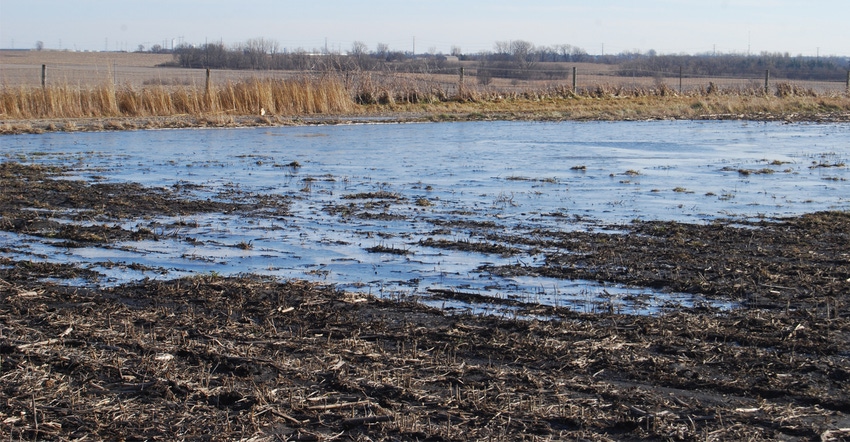
Having to cut spending to help balance the state’s budget, the 2017 Iowa Legislature didn’t pass as much legislation this year. However, lawmakers did approve several ag-related bills and provided some increased funding for certain programs before adjourning April 22.
Key agricultural measures approved by the Legislature during its recently completed 2017 session included some additional funding to support water quality and soil conservation efforts. The Legislature also approved funds for additional foreign animal disease response planning, and continued funding for the state’s Renewable Fuels Infrastructure Program.
“I was encouraged by the strong support for a number of important ag issues this past legislative session, including soil and water conservation efforts, animal disease response planning, and renewable fuels,” says Bill Northey, Iowa ag secretary. “I clearly understand the difficult budget situation the Legislature faced, and I greatly appreciate their efforts to provide funding for these important priorities.”
Iowa Water Quality Initiative
The Legislature approved close to $10.6 million to support the Iowa Water Quality Initiative in the next fiscal year, which starts July 1. This is a $975,000 increase in funding from the current fiscal year for this program. The legislation now goes to Gov. Terry Branstad and must be signed before going into effect.
This $10.6 million includes $3 million for water quality from the state’s general fund (SF 510), $2.4 million from the Environment First Fund (SF 510) and $5.2 million from the Rebuild Iowa Infrastructure Fund (RIIF budget, HF 643).
The funds will also allow the Iowa Department of Agriculture and Land Stewardship to continue to offer cost-share statewide to farmers trying new water quality practices, says Northey. This appropriation will also continue work in targeted watersheds to achieve measurable water quality improvements, expand urban conservation efforts, and develop new programs to help engage all Iowans in improving water quality.
Continue to offer cost-share
The department received over $8.3 million for soil conservation cost-share. Of that amount, $450,000 is directed to the Hungry Canyon’s account and $40,000 to the Loess Hills Alliance account. The remaining roughly $7.8 million for the department’s cost-share program is an increase from the $6.75 million the department received for cost-share this year. In 2016, the state’s investment in this program generated almost $8.7 million in matching funds from Iowa farmers and landowners for conservation practices.
The 2017 Iowa Legislature also provided nearly $1.9 million to support the closure of Agriculture Drainage Wells. Of the 300 registered ADWs in Iowa, 18 remain to be closed at a total estimated cost of $7.5 million. This level of funding over each of the next four years would allow all of the remaining ADWs to be closed.
“Legislators made significant investments in conservation and water quality efforts again this session, despite the challenging budget situation,” notes Northey. “I’m extremely encouraged as the annual funding for water quality continues to grow, and I remain committed to working with legislators to finalize an ongoing water-quality funding stream. We need to figure out a way to fund increased water quality protection practices in Iowa. The Legislature can, hopefully, get that accomplished in its 2018 session, which begins next January.”
Funds for animal disease control
The Legislature provided $100,000 to aid in preparing for a foreign animal disease outbreak, such as foot-and-mouth disease or highly pathogenic avian influenza. The funds will increase the capacity of the Iowa Department of Ag’s animal industry bureau and provide resources to better equip and prepare for a future animal disease response.
The Iowa ag department received $3 million through the Rebuild Iowa Infrastructure Fund to continue the Iowa Renewable Fuels Infrastructure Program. This program offers cost-share grants for E85 dispensers, blender pumps, biodiesel dispensers and biodiesel storage facilities. Since 2007, it has provided more than $33 million to fuel retailers for infrastructure that gives customers additional access to renewable fuels. This includes 309 projects statewide that are installing E85 fuel or ethanol blender pumps, and 413 projects installing biodiesel pumps or storage tanks.
Palmer amaranth a noxious weed
Legislation changing some annual licenses from the department to two-year licenses to increase efficiency was proposed by the department, and it passed the Legislature. Licenses that were part of the legislation include commercial feed, egg handlers and poultry dealers. The legislation is still awaiting the governor’s signature.
Finally, the list of noxious weeds in Iowa’s weed law was updated to include Palmer amaranth. This is in response to the recent discovery of Palmer in Iowa. A relatively new weed here, it has moved in from the southern U.S. The Iowa Department of Ag plans to hold stakeholder meetings later this year to discuss other possible updates to the Iowa noxious weed law that may provide additional tools, as farmers and communities respond to noxious weeds.
About the Author(s)
You May Also Like




